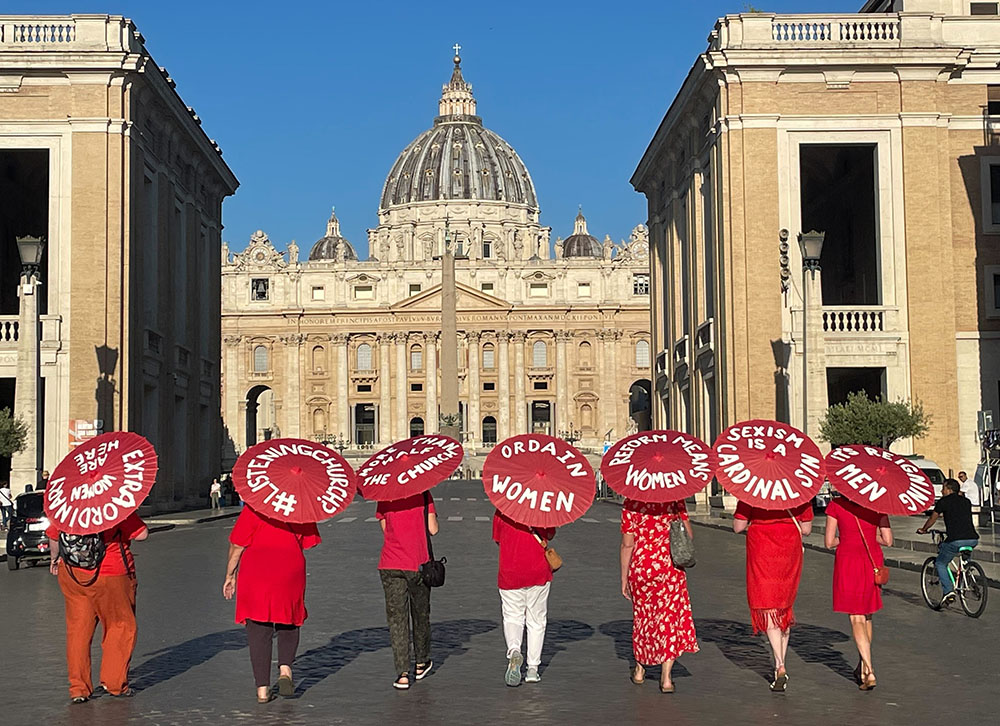
Women's ordination advocates walk toward St. Peter's Square as part of a witness on Aug. 29, 2022. (NCR photo/Christopher White)
For a Synod of Bishops whose purpose "is not to produce documents," as the Vatican's document for the continental stage put it, this synodal process has created quite a few good ones.
The most recent being the 60-page instrumentum laboris, or working document, released by the synod office on June 20. With themes of communion, mission and participation, the document invites spiritual reflection and discernment on how the global church might better attend to the challenges of today with "missionary urgency."
While a tool for reflection and spiritual discernment, the document also calls for concrete proposals that might further co-responsibility in the service of the Gospel.
There is an authenticity to this document that is refreshing and honest. From calling for structural changes, to the need for "healthy belonging" for women in the church, to the recognition that women are "ministering ... at the 'prophetic margins,' " there is no doubt many women's voices — in their diversity — were not just heard, but centered. In fact, I delighted in the inclusion of a line of caution at the end of one of the many "women's sections" in the document to avoid "treating women as a homogeneous group or an abstract or ideological subject of debate."
Advertisement
Yet despite the pages of expansive language on the dignity of women, the question of opening ordained ministries to women is reduced to "envisaging" the inclusion of women in the diaconate. While many of us don't require much imagination to envisage such a thing — for certainly women serving in diaconal roles is a reality around the world, officially recognized or not — I found this a reductive proposal. Can we not also envisage women's inclusion in the priesthood?
In January, San Diego Cardinal Robert McElroy wrote: "The question of the ordination of women to the priesthood will be one of the most difficult questions confronting the international synods in 2023 and 2024." One has to wonder where that question went in this document, and if this foreshadows more stifling to come.
The synodal dialogue will be painfully incomplete if it does not address the widespread calls to open all ordained ministries to women. If truly, as the instrumentum laboris says, "there is no border that this movement of the Spirit does not feel compelled to cross, to draw all into its dynamism," we must pursue that "horizon of hope" beyond any shortcuts that attempt to limit the call of God.
We must also continue to work to widen the synodal tent to include the voices of women who have discerned sincere calls to priesthood — some of the most marginalized voices in the church — are heard this October. If the church is to live up to its synodal call in the instrumentum laboris to recognize the "common dignity deriving from Baptism," it must welcome their witness.
While the participants of the synod, named by the Vatican on July 7, represent geographical and ideological diversity, there are no certain signs that voices of women called to priesthood will be adequately represented.
Women around the world are crying out: How long must we discern our discipleship?
In the opening address for the three-year process for the synod in October 2021, Pope Francis said: "That expression — 'We have always done it that way' — is poison for the life of the church. Those who think this way, perhaps without even realizing it, make the mistake of not taking seriously the times in which we are living. The danger, in the end, is to apply old solutions to new problems."
In fact, the document suggests considering what "new ministries" could be created for women specifically. Just as it isn't difficult to envisage women as deacons, there is an abundance of evidence of women around the world embodying "new ministries" that meet the needs of the people of God. I think of women-church and base community models that are not constrained by what is, and is not, supposedly permissible in the eyes of Rome.
We can't be sure what the Vatican means by "new ministries" for women, but they might do well to look to the creative and prophetic leadership of women and nonbinary people who have cultivated and share an abundance of grace on the margins.
And while I will not discount the value and affirmation that comes from a Vatican process or document capturing the experiences of women with a semblance of depth, we simply must journey together beyond words. If we are to take up the challenge of "missionary urgency" the synod must listen to and walk with those women called to priesthood for whom the time is now.
Women around the world are crying out: How long must we discern our discipleship? The Women's Ordination Conference plans to be present in Rome throughout the synod as a witness and a prayer that those within the synod hall will be courageously receptive to the movements of the Spirit. We don't have to envisage equality when we follow the Gospel; we can live it.







